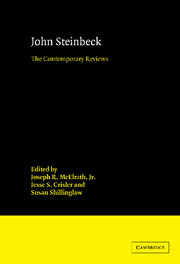Book contents
- Frontmatter
- Contents
- Series Editor's Preface
- Introduction
- 1 Cup of Gold (1929)
- 2 The Pastures of Heaven (1932)
- 3 To a God Unknown (1933)
- 4 Tortilla Flat (1935)
- 5 In Dubious Battle (1936)
- 6 Of Mice and Men (the novel, 1937)
- 7 The Red Pony (1937)
- 8 Of Mice and Men (the play, 1937)
- 9 The Long Valley (1938)
- 10 The Grapes of Wrath (1939)
- 11 The Forgotten Village (1941)
- 12 Sea of Cortez (1941)
- 13 The Moon Is Down (the novel, 1942)
- 14 The Moon Is Down (the play, 1942)
- 15 Bombs Away (1942)
- 16 Cannery Row (1945)
- 17 The Wayward Bus (1947)
- 18 The Pearl (1947)
- 19 A Russian Journal (1948)
- 20 Burning Bright (the novel, 1950)
- 21 Burning Bright (the play, 1950)
- 22 The Log from the Sea of Cortez (1951)
- 23 East of Eden (1952)
- 24 Sweet Thursday (1954)
- 25 The Short Reign of Pippin IV (1957)
- 26 Once There Was a War (1958)
- 27 The Winter of Our Discontent (1961)
- 28 Travels with Charley in Search of America (1962)
- 29 America and Americans (1966)
- 30 Journal of a Novel: The East of Eden Letters (1969)
- 31 The Acts of King Arthur and His Noble Knights (1976)
- 32 Working Days: The Journals of The Grapes of Wrath 1938–1941 (1989)
- Index
24 - Sweet Thursday (1954)
Published online by Cambridge University Press: 03 May 2010
- Frontmatter
- Contents
- Series Editor's Preface
- Introduction
- 1 Cup of Gold (1929)
- 2 The Pastures of Heaven (1932)
- 3 To a God Unknown (1933)
- 4 Tortilla Flat (1935)
- 5 In Dubious Battle (1936)
- 6 Of Mice and Men (the novel, 1937)
- 7 The Red Pony (1937)
- 8 Of Mice and Men (the play, 1937)
- 9 The Long Valley (1938)
- 10 The Grapes of Wrath (1939)
- 11 The Forgotten Village (1941)
- 12 Sea of Cortez (1941)
- 13 The Moon Is Down (the novel, 1942)
- 14 The Moon Is Down (the play, 1942)
- 15 Bombs Away (1942)
- 16 Cannery Row (1945)
- 17 The Wayward Bus (1947)
- 18 The Pearl (1947)
- 19 A Russian Journal (1948)
- 20 Burning Bright (the novel, 1950)
- 21 Burning Bright (the play, 1950)
- 22 The Log from the Sea of Cortez (1951)
- 23 East of Eden (1952)
- 24 Sweet Thursday (1954)
- 25 The Short Reign of Pippin IV (1957)
- 26 Once There Was a War (1958)
- 27 The Winter of Our Discontent (1961)
- 28 Travels with Charley in Search of America (1962)
- 29 America and Americans (1966)
- 30 Journal of a Novel: The East of Eden Letters (1969)
- 31 The Acts of King Arthur and His Noble Knights (1976)
- 32 Working Days: The Journals of The Grapes of Wrath 1938–1941 (1989)
- Index
Summary
Hugh Holman.
“A Narrow-Gauge Dickens.”
New Republic, 130
(7 June 1954), 18–20.
John Steinbeck's latest novel, Sweet Thursday∧ is both a sequel to Cannery Row and an implicit comment on Steinbeck's career—a career which has been one of the most baffling in recent literary history. He has appeared to be a naturalist of the Biological Determination persuasion and a celebrator of the simple joys of life; the author of effective social propaganda and of mystically symbolic and wryly comic parables. Certainly a fair portion of those who read him as a social critic in the 1930's are not among the still large numbers who read him as a writer of picaresque comedy or of romantic parables.
Among the fifteen volumes of his prose fiction that preceded Sweet Thursday, Steinbeck has produced an impressive strike novel (In Dubious Battle), a powerfully effective propaganda novel (The Grapes of Wrath), three stylized experiments with plays in novel form (Of Mice and Men, The Moon Is Down, and Burning Bright), a volume of distinguished short stories (The Long Valley), an “epic” prose poem of too great length (East of Eden), and a group of picaresque, comic novels on the delights of poverty and lawlessness (The Pastures of Heaven, Tortilla Flat, Cannery Row, and The Wayward Bus).
The ideas which help to shape these books are as diverse as the books themselves. They include a pervasive and informed interest in marine biology, a fund of late transcendental mysticism, a Rousseauistic belief in the innate goodness of man and the inherent evil of social systems, a faith in social progress through better social structures, and an anti-intellectualism so intense that it is most likely to find truth in the mouths of half-wits and the demented.
- Type
- Chapter
- Information
- John SteinbeckThe Contemporary Reviews, pp. 405 - 426Publisher: Cambridge University PressPrint publication year: 1996

